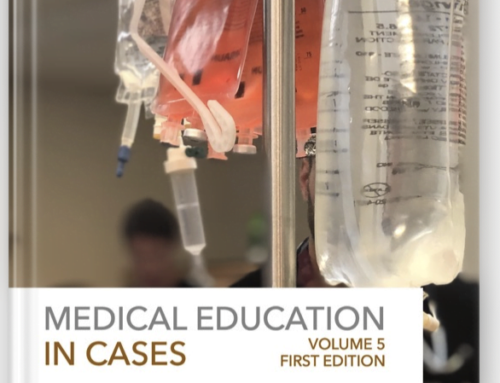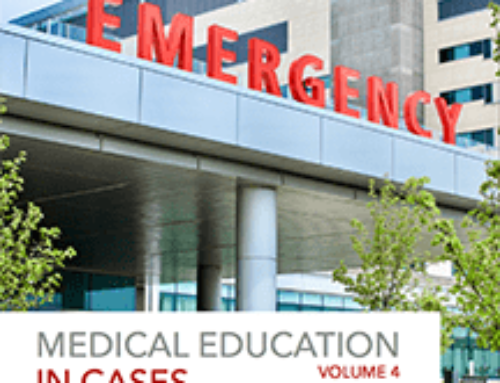The use of online open access secondary has increased recently. Many clinicians are turning to these resources for continuing education. There is debate about these resources that can occasionally result in conflict between early adopters and those with a more traditional approach. Please join us in discussing the case this of the FOAM Faux Pas. We would love your thoughts and advice.

P.S. Teresa Chan, Brent Thoma, Sarah Luckett-Gatopoulos, and I would also like to invite you all to register for the ALiEM MEdIC pre-conference workshop at SMACC. Come out and be part of a LIVE version of the ALiEM MEdIC case development and release for a special SMACC version of the case series!
MEdIC Series: The Concept
Inspired by the Harvard Business Review Cases and initially led by Dr. Teresa Chan (@TChanMD) and Dr. Brent Thoma (@Brent_Thoma), the Medical Education In Cases (MEdIC) series puts difficult medical education cases under a microscope. On the fourth Friday of the month, we pose a challenging hypothetical dilemma, moderate a discussion on potential approaches, and recruit medical education experts to provide “Gold Standard” responses. Cases and responses are be made available for download in PDF format – feel free to use them! If you’re a medical educator with a pedagogical problem, we want to get you a MEdIC. Send us your most difficult dilemmas (guidelines) and help the rest of us bring our teaching to the next level.
The Case of The FOAM Faux Pas
by Brent Thoma (@Brent_Thoma)
It was only her sixth month as staff, but Stacy had found her groove. In addition to all of her board exam studying, she had been regularly listening to podcasts and reading up on the latest literature on her favorite medical blogs. She felt like she may be as up-to-date on the medical literature as she may ever be and she was finally starting to feel comfortable as the attending in the department. She just had to determine the disposition for a couple more patients and she’d be off to go prepare for a date with her husband that night. Then she saw Dr. Walters coming towards her – and he looked mad.
“Just what were you thinking yesterday!?” he asked her, angrily.
Stacy thought back to her day yesterday to try and figure out what he was referring to. She had urgently consulted him on a globe rupture and he hadn’t been upset with her then. There was also that patient with the corneal abrasion that she sent to him for follow-up. That case had been so simple though – she didn’t miss something, did she?
“I’m not sure what you’re referring to, Dr. Walters.”
“Tetracaine? You gave Tetracaine to a patient with a corneal abrasion? What were you thinking!? I thought we taught you better than that at this medical school.”
“Well…”
“Well what?” he cut her off, “She could have lost her eye! Who taught you that this was okay?”
“Well actually, Dr. Walters, I heard about it on a podcast. I understand that there’s some new evidence that suggests it’s actually safe to use dilute tetracaine in these pat-“
“A podcast…” he replied, “A podcast? So is that how we practice medicine these days? Looking up what some random quacks on the internet have to say? I thought we taught you better than that.”
Stacy’s eyes dropped to the floor as she began to question herself.
You are one of Stacy’s long term mentors and she just relayed this story to you. She is quite distraught both over how Dr. Walters responded and questioning her use of secondary sources such as blogs and podcasts for her education.
Key Questions
- How would you counsel Stacy about this negative encounter with her colleague? What are main factors contributing to the conflict? What should she do next?
- Do you think Dr. Walters’ skepticism of Stacy’s reliance on secondary sources is reasonable? With the large body of available primary literature how should emergency medicine physicians stay “safely” up to date?
- How would you have responded to Dr. Walters in this scenario?
Weekly Wrap Up
As always, we posted the expert responses and a curated commentary derived from the community responses one week after the case was published. This time the two experts are:
- Dr. Anton Helman, is an Emergency Physician at North York General in Toronto. He is an Assistant Professor at the University of Toronto, Division of Emergency Medicine, the Education Innovation Lead at the Schwartz-Reisman Emergency Medicine Instititute and is on the advisory board of The Teaching Institute. He is the founder and host of Emergency Medicine Cases.
- Dr. Tessa Davis, is a Paediatric EM physician in Sydney. She develops and encourages health innovation through Don’t Forget the Bubbles, GuidelinesForMe, iClinicalApps, Learnmed.
On May 1, 2015 we will post the Expert Responses and Curated Community Commentary for the Case of The FOAM Faux Pas. After that date, you may continue to comment below, but your commentary will no longer be integrated into the curated commentary. That said, we’d love to hear from you, so please comment below!
All characters in this case are fictitious. Any resemblance to real persons, living or dead, is purely coincidental. Also, as always, we will generate a curated community commentary based on your participation below and on Twitter. We will try to attribute names, but if you choose to comment anonymously, you will be referred to as your pseudonym in our writing.






